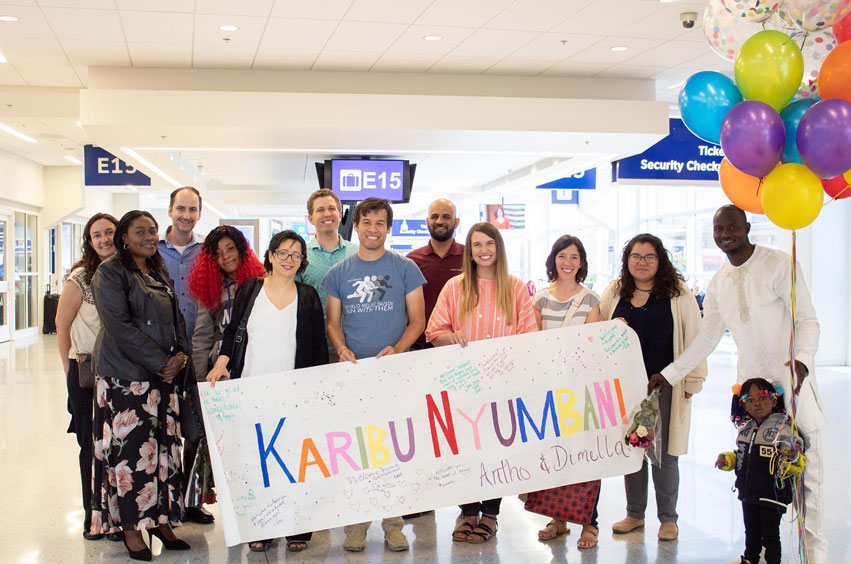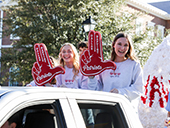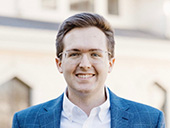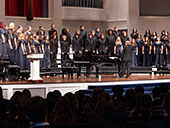Helping Refugee Families Reach Self-Sufficiency: DBU Alumna Angela Hayward Serves with World Relief
This article is over six months old and may reference former titles for DBU faculty or staff, discontinued programs, or other details that have since changed. If you have any questions, please contact us at news@dbu.edu, or (214) 333-5172.

Many years ago, the United Nations designated June 20 as World Refugee Day. As this falls on Father’s Day each year, this especially accentuates the fact that there are many children around the world who have been separated by their fathers (and mothers) through extremely troubling circumstances.
“A common story found among refugees is that oftentimes families get separated and do not get to see their relatives for many years, if at all, “says DBU alumna Angela Hayward, who has been working with World Relief since 2017. “One of the most beautiful things I’ve had the honor of witnessing was when my coworker (also a former refugee) was reunited with his wife after three years of separation and met his daughter for the first time at the DFW airport” (pictured above).
Justin Waka, a refugee from the Democratic Republic of Congo, was received at the airport by the World Relief resettlement team in 2016, and not long after, was hired on to work with them. However, because Justin applied when he was very young before he got married, he could not add his wife, Antho, who had also applied separately but was not able to join him.
“He took a leap of faith and got on the airplane with the hopes that his pregnant wife would soon join him," Hayward explains. "In June of 2019, after lots of prayers and three long years of waiting, he received the news that she would be able to come home and he would get to hold his three-year-old daughter for the first time!”
This is just one of many amazing stories of God’s faithfulness and provision that DBU alumna Angela Hayward has witnessed since she started with World Relief following her graduation with a degree in sociology.
Angela grew up in New Orleans, Louisiana, until a little over a year after hurricane Katrina when her family relocated to the quaint town of Fredericksburg in Hill County, Texas.
As an undergraduate student at DBU, Angela was involved with Sigma Chi Eta and regularly participated in their women’s ministry that provided baby showers for young pregnant women who did not always have the support of their families. She also worked in the International Office and later served as a Resident Assistant in international off-campus housing. This would continue the fanning of a flame of her compassion to serve the nations who have made DFW their home.
Recently, we had a chance to connect with Angela and wanted to ask her a couple of questions about her work with World Relief and refugees.
What led you to work with international people groups, particularly with refugees at World Relief?
From a young age, I had an interest in international cultures. Once I became a Christian, my faith merged with my love of learning about other cultures. I had several opportunities to serve on a few short-term overseas mission trips during high school and college and knew that God was calling me to serve cross-culturally after graduation. At the time, I thought that would mean living/working in another country. I had no idea God would end up leading me right down the road from DBU to Fort Worth.
My first encounter with the refugee community was during freshman year when I volunteered with the DBU BSM at an apartment complex in Dallas where we worked with Burmese refugees in the after-school tutoring program. At this point, I had zero knowledge about these people or where they came from, but those interactions made a lasting impression on me.
I continued to learn more about refugees during my junior and senior years after taking Professor Hopper’s “Understanding Islam” class and Dr. Mark Alexander’s “Cross-Cultural Living and Ministry.” This sparked an interest to become more involved, which led to an internship at World Relief in the Fall of 2017.
I was offered a full-time position and began working with World Relief immediately after graduation. I currently work as a case manager in the Social Adjustment Service program. My main focus is on helping individuals and families (often single mothers) achieve self-sufficiency.
How would you describe the current challenges of ministering to refugees and what more can we do to help?
A big challenge is that a lot of people lack awareness and understanding as to who refugees are. As a result, we are sometimes met with a lot of pushback that comes with the politicization of this historically bipartisan issue. The global refugee crisis is one of the largest humanitarian issues facing our generation today and I believe it’s our responsibility, not as Americans, not as advocates, but as Christians to stand up and be a voice for some of the world’s most vulnerable populations. It’s more important now than ever to shed light and raise awareness surrounding this topic.
Right now, 22.5 million people are living outside of their home country because they were forcibly displaced due to persecution based on race, religion, nationality, or political opinion.
When I meet refugees, I see people just like you and me. While they each come from their own unique culture and worldview, they desire to have their basic needs met. They desire security, to keep their families safe, and a place to call home without fear of persecution. Refugees do not choose to leave their home countries. More often than not, I hear refugees speak of being homesick, longing for a place that they can never return to because their lives would be at risk if they did. Refugees don’t choose to become refugees.
We have a unique opportunity as Christians living in America today. While we are called to preach the Gospel to all nations, God is also bringing all nations to our front door. We have the opportunity to serve Christ by serving the most vulnerable right here in our own communities.
Dr. Michael Whiting is an Assistant Professor of Christian History and Leadership in the Cook School of Leadership at Dallas Baptist University. He also served as the Director of Written Content in University Communications.








